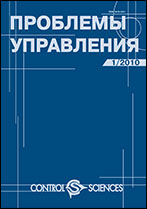|
This article is cited in 3 scientific papers (total in 3 papers)
Reviews
Information communities in social networks. Part I: From concept to mathematical models
D. A. Gubanov, I. V. Petrov
V.A. Trapeznikov Institute of Control Sciences, Russian Academy of Sciences, Moscow, Russia
Abstract:
This survey covers the literature related to information communities in mutually complementary areas: the formation of information communities in social networks and some applied aspects of identifying and analyzing information communities in social networks. First, mathematical models describing the formation of information communities under uncertainty are considered. Among these models, the most relevant ones are the mathematical models of opinion/belief dynamics reflecting any changes in the beliefs of nodes under the influence of other network nodes and significant effects (in particular, the preservation of differences in beliefs and the divergence of beliefs) that lead to the formation of information communities. In part I of the survey, the concept of an information community is first presented. Then information processing and decision-making by an agent in a social network under external uncertainty are outlined. The factors influencing the formation of information communities in the network are highlighted, and the basic models of Bayesian agents and their extensions are investigated.
Keywords:
social networks, information community, formation of information communities, analysis of information communities, belief formation.
Received: 26.08.2020
Revised: 09.11.2020
Accepted: 24.11.2020
Citation:
D. A. Gubanov, I. V. Petrov, “Information communities in social networks. Part I: From concept to mathematical models”, Probl. Upr., 2021, no. 1, 15–23; Control Sciences, 1 (2021), 13–20
Linking options:
https://www.mathnet.ru/eng/pu1222 https://www.mathnet.ru/eng/pu/v1/p15
|

|




 Contact us:
Contact us: Terms of Use
Terms of Use
 Registration to the website
Registration to the website Logotypes
Logotypes








 Citation in format
Citation in format 
